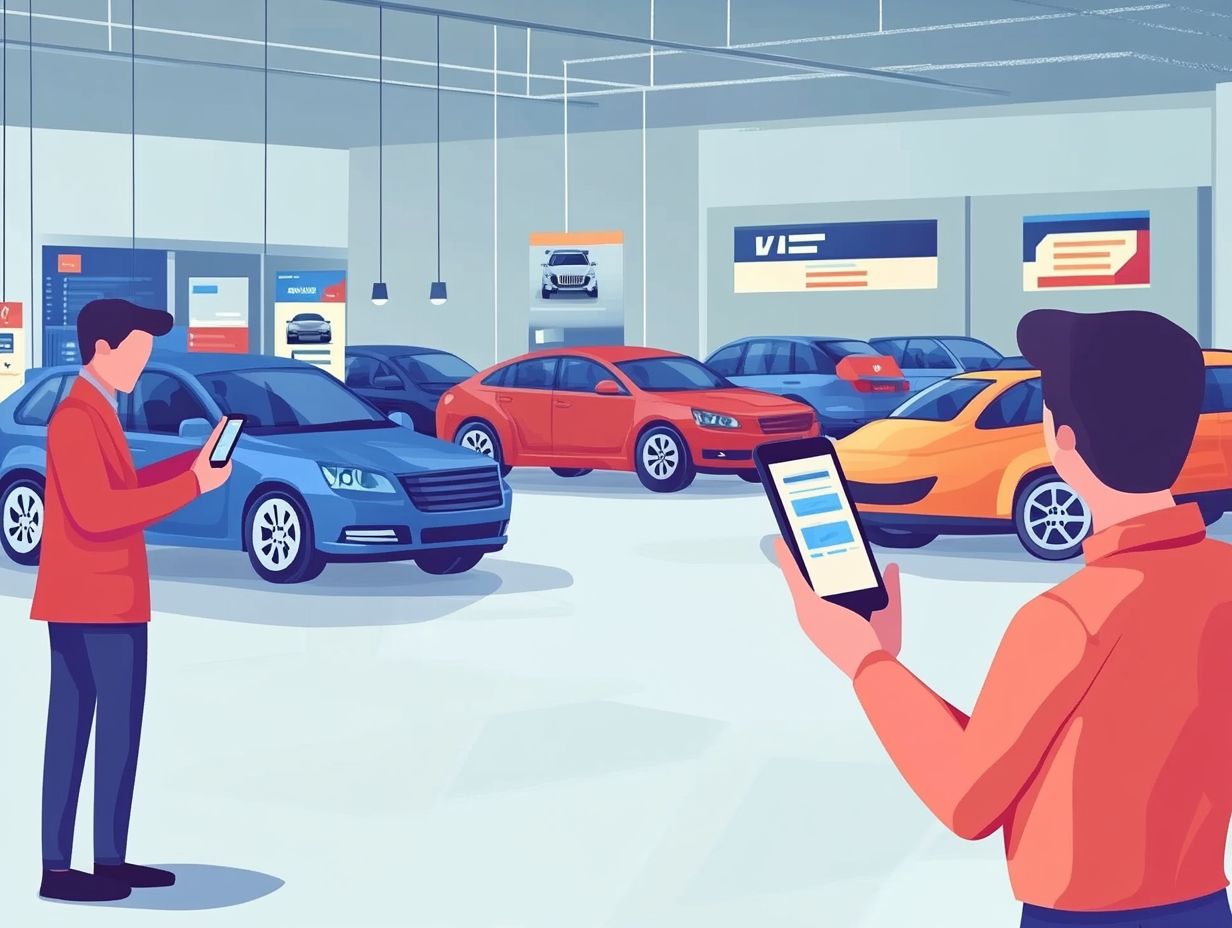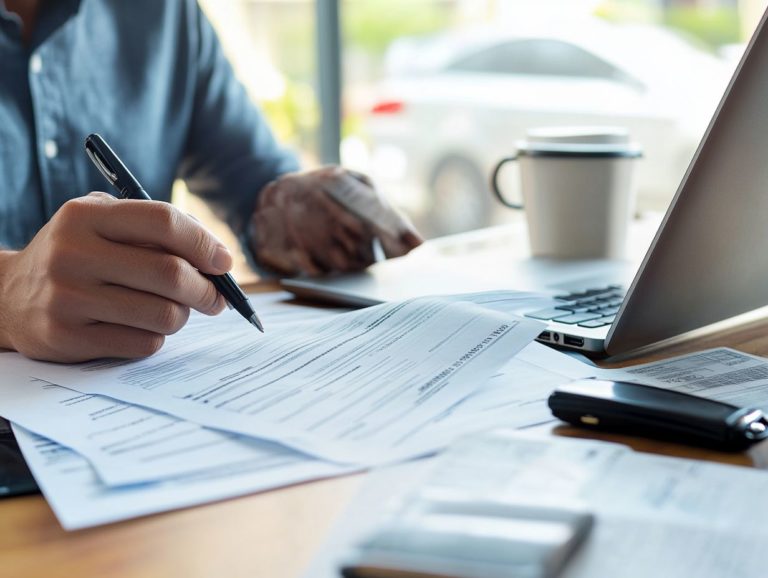Tips for Maximizing Trade-In Value
When the moment arrives to part ways with your vehicle, grasping its trade-in value can influence your next purchase. This guide delves into the essence of trade-in value and highlights key factors that affect it.
It offers insights on how you can prepare your vehicle to secure a more favorable price. It also examines negotiation strategies and alternative selling options, empowering you to make the most advantageous decision for your finances.
Get ready to maximize your trade-in value like never before!
Contents
- Key Takeaways:
- Understanding Trade-In Value
- Factors that Affect Trade-In Value
- Preparing Your Vehicle for Trade-In
- Negotiating Trade-In Value
- Alternative Options for Selling Your Vehicle
- Frequently Asked Questions
- What is trade-in value and how can I maximize it?
- Is it better to trade in my vehicle at a dealership or sell it privately?
- What are some common mistakes to avoid when trying to maximize my trade-in value?
- Can I negotiate the trade-in value of my vehicle?
- What happens to my trade-in vehicle after I trade it in?
- Can I get a tax break for trading in my vehicle?
Key Takeaways:

- Understand trade-in value and its influence on your vehicle’s overall worth.
- Boost your trade-in value by maintaining your car, keeping mileage low, and researching current market trends.
- Clean your car thoroughly, keep service records organized, and use smart negotiation techniques to secure a better deal.
Understanding Trade-In Value
Understanding trade-in value is crucial for anyone considering selling or trading their vehicle at a dealership. This value represents what a dealer is prepared to offer for your car, factoring in elements like its condition, current market demand (the desire for certain types of vehicles among buyers), and comparable sales data from trusted resources such as Kelley Blue Book and Edmunds, which provide vehicle valuations.
By arming yourself with this insight, you can negotiate skillfully to enhance the equity in your vehicle and secure the most advantageous deal possible.
What is Trade-In Value?
Trade-in value is essentially what a dealership is willing to offer you for your used vehicle when you decide to trade it in while purchasing your next car. This value can fluctuate significantly due to several factors, such as your vehicle s condition, age, mileage, and even market demand.
Market trends can be quite the game-changer. For example, when SUVs are hot commodities, you may find that a used SUV fetches a higher trade-in value compared to a sedan. Dealership policies can greatly affect the offers you receive, as some employ aggressive pricing strategies to attract customers.
If you’re considering a trade-in, grasping this value is essential. Not only does it enable you to negotiate effectively, but it also ensures that you make a well-informed decision during the purchasing process.
Factors that Affect Trade-In Value
Your vehicle’s trade-in value is influenced by various factors that you should consider. The overall condition of your car, its mileage, and the current market demand all play crucial roles.
Keep in mind that market demand can change based on seasons and economic conditions, impacting what you can expect in return.
Condition of the Vehicle
The condition of your vehicle significantly influences its trade-in value, as dealers will carefully assess both its mechanical condition and cosmetic attributes before extending an offer.
This evaluation includes several key factors, such as your vehicle s mileage, the condition of the engine, and the visible wear and tear on both the exterior and interior. To enhance your trade-in value, consider addressing common repairs, such as:
- Fixing minor scratches
- Replacing worn tires
- Resolving any mechanical issues
Presenting a clean car is vital. A thorough detailing complete with vacuuming and polishing can create a favorable impression, showcasing that the vehicle has been well cared for. Furthermore, having all maintenance records organized and readily accessible can bolster a dealer s perception of value during negotiations.
Mileage

Mileage is a crucial factor that significantly impacts your trade-in value. Higher mileage often signals more wear and tear, affecting your vehicle’s overall worth.
As your vehicle racks up the miles, it indicates prolonged use. Dealerships typically view this as a higher risk for future repairs, which can drive down your car s market value.
When you re considering a trade-in, dealers will often examine the vehicle history report. This document shows your car s past, including mileage and service details, providing a comprehensive picture of your vehicle s overall condition.
Thus, a well-maintained vehicle with lower mileage can lead to significantly better offers. This underscores the importance of mileage as a critical element in your negotiation process.
Market Demand
Market demand can greatly impact trade-in value, as the popularity of certain vehicles like SUVs often fluctuates with seasonal trends and consumer preferences.
Take winter, for instance. You might notice a noticeable spike in demand for vehicles that handle snowy and icy conditions. This boosts trade-in values for all-wheel-drive models.
As summer rolls around, preferences shift. Consumers typically gravitate toward convertibles and fuel-efficient cars, which once again influence trade-in prices.
This cyclical dance means that you can strategically enhance your trade-in value by timing your transactions to align with these seasonal changes. Therefore, it s essential to actively monitor market trends and seasonal preferences, allowing you to make informed decisions that can maximize your vehicle’s worth.
Preparing Your Vehicle for Trade-In
Preparing your vehicle for trade-in requires a series of strategic steps aimed at enhancing its appeal and value. This includes thorough cleaning, adhering to regular maintenance schedules, and carefully keeping records of your service history.
By taking these measures, you position yourself to maximize the return on your investment.
Cleaning and Maintenance Tips
Proper cleaning and maintenance can significantly boost your vehicle’s trade-in value, making it far more attractive to potential buyers at a dealership.
- Thorough vacuum: Ensure you don t overlook those hard-to-reach spots like under the seats and in the console.
- Upholstery cleaner: A quality cleaner can breathe new life into your fabrics.
- Plastic surfaces: Use a mild detergent to restore their shine.
- Exterior wash: A comprehensive wash followed by waxing protects the paint and addresses any unsightly scratches with cosmetic repairs.
- Routine maintenance: Check tire pressure and oil levels to enhance performance.
Documenting Service History
Documenting your vehicle’s service history is essential when you’re preparing for a trade-in. It provides potential dealers with solid proof of regular maintenance and any repairs you’ve made.
By diligently keeping records of inspections, repairs, and maintenance, you create a comprehensive overview. This not only showcases your vehicle’s reliability but also highlights your commitment to its care.
This meticulous documentation acts as a transparent history for interested dealers, fostering trust and confidence in the condition of your vehicle. Presenting a thorough service history can significantly boost your potential trade-in value, signaling that your car has been well cared for.
This can lead to better offers, ensuring you receive the best possible deal when it’s time to exchange vehicles.
Negotiating Trade-In Value

Negotiating trade-in value is a crucial step in maximizing your equity when purchasing a vehicle. Having a solid understanding of your vehicle’s worth is essential to this process.
Effective Strategies for Getting a Higher Value
Employing effective strategies in negotiating your trade-in value can lead to significantly higher offers from dealerships, ensuring you secure the best deal possible.
Timing your trade-in to align with peak selling seasons or when demand for your vehicle is at its highest can greatly enhance your leverage. Understanding the current market value of your vehicle through comprehensive data is crucial. This knowledge provides you with solid evidence to bolster your negotiations.
By utilizing competing offers from other dealerships, you can create a sense of urgency and spark competition among them for your vehicle. It’s important to maintain a confident yet respectful demeanor when communicating these strategies. Clearly present your research and highlight specific offers to encourage a favorable response.
Alternative Options for Selling Your Vehicle
When you consider selling your vehicle, grasping the various alternatives such as opting for a private sale versus a trade-in can significantly influence your overall equity and financial outcome.
Private Sale vs. Trade-In
A private sale often presents the opportunity for you to secure higher equity compared to a trade-in. You can negotiate directly with buyers instead of settling for dealership offers.
This direct negotiation can lead to a more favorable sale price, especially if you’ve done your homework on the vehicle’s market value. However, be prepared to invest some effort advertising the vehicle, managing inquiries, and arranging viewings are all part of the process.
While a trade-in may appear more convenient, streamlining your buying process, it typically offers a lesser financial return. This is mainly because dealerships tend to offer lower prices to maintain their profit margins when reselling.
Therefore, it’s essential to carefully weigh the visibility of your vehicle in the market and the financial effects of both methods to truly maximize your car’s value.
Frequently Asked Questions
What is trade-in value and how can I maximize it?

Trade-in value refers to the amount of money a dealership will offer for your current vehicle when you are looking to purchase a new one. You can maximize this value by following these tips:
- Keep your vehicle well-maintained and in good condition.
- Research the market value of your vehicle before negotiating.
- Consider timing your trade-in during a dealership’s sales event or end-of-year clearance.
- Be prepared to negotiate and consider multiple offers from different dealerships.
Is it better to trade in my vehicle at a dealership or sell it privately?
Choosing between a trade-in and a private sale can be exciting, but it s important to know what works best for you. Trading in your vehicle at a dealership can be more convenient and hassle-free, but selling it privately may potentially get you a higher value. Consider your priorities and weigh the pros and cons of each option.
What are some common mistakes to avoid when trying to maximize my trade-in value?
Some common mistakes include not researching the market value of your vehicle, waiting until your vehicle is in poor condition, and not being open to negotiating with multiple dealerships. These can all result in a lower trade-in value. Make sure to do your research and be prepared before heading to the dealership.
Can I negotiate the trade-in value of my vehicle?
Yes, you can negotiate the trade-in value of your vehicle. Be prepared to present evidence of your vehicle’s market value and don’t be afraid to negotiate with multiple dealerships. Remember to also consider other incentives or offers the dealership may have to sweeten the deal.
What happens to my trade-in vehicle after I trade it in?
After you trade in your vehicle, the dealership will typically resell it on their lot. They may also sell it at an auction or transfer it to another dealership. It’s important to thoroughly clean and maintain your vehicle before trading it in to ensure a better resale value.
Can I get a tax break for trading in my vehicle?
In some states, you may be eligible for a tax break when trading in your vehicle. This means you only pay sales tax on the difference between the trade-in value and the new vehicle’s purchase price. Check with your state’s regulations to see if this applies to you.
Ready to maximize your trade-in value? Start your research today!






